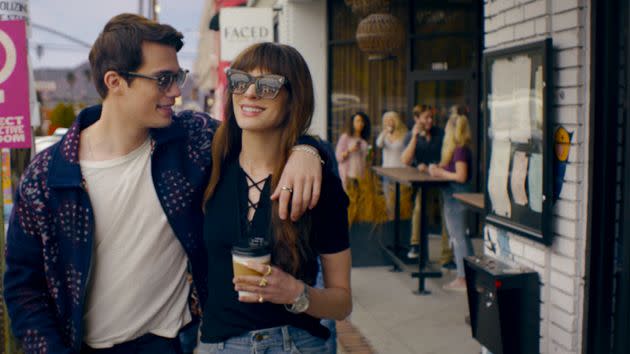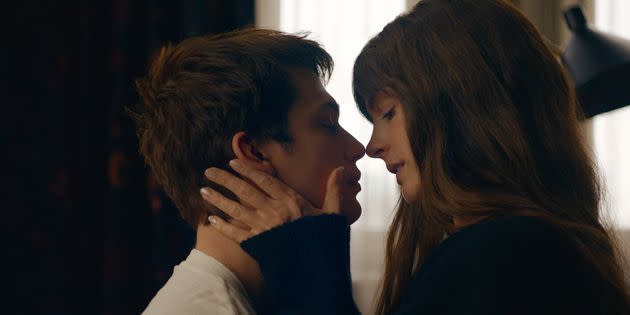'The Idea Of You' Is Not As Good As The Bold And Sexy Love Story In The Book

It’s easy to be swept away by the idea of “The Idea of You,” the new romantic comedy starring Anne Hathaway as divorced mom and gallery owner Solène Marchand and Nicholas Galitzine as British boy band megastar Hayes Campbell. A celebrity falling for a non-famous person is a trope as old as time, or at least as old as Hollywood, and this film gives it a fresh update through its adaptation of Robinne Lee’s super-spicy 2017 novel.
The twist in both the book and the movie is the age gap.
Solène is a mom who just turned 40. Hayes is 24. The reversal of the older-man, younger-woman relationship and the promise of Hathaway as a globe-trotting mom having a sexual awakening (as well as her on-screen chemistry with Galitzine) have created significant buzz for the movie. The trailer broke the record for most-watched trailer for a streaming movie.
This level of anticipation makes sense. The escapist plot, high-profile casting and promise of steamy love scenes are the ingredients of a standout rom-com, but this movie does not live up to its idea, and there’s a chance it will leave you more than a little underwhelmed, especially if you’re a fan of the book.
The movie softens the book to make Hathaway’s character more accessible. Instead of a Range Rover, Solène drives a Subaru. Instead of a midcentury modern house in the hills, overlooking the ocean, she lives in a cozy bungalow that her pretentious ex-husband refers to as a starter home. Instead of leaving her husband because he didn’t support her career ambitions, Daniel (Reid Scott) cheats on her with a much younger woman. The effect, as Julie Miller describes in Hathaway’s April cover story for Vanity Fair, is that “Solène is less tony and more relatable.”
Discrepancies between the book and movie also serve to make the age gap more palatable and Solène’s decisions as a mother less questionable.
In the movie, Solène meets Hayes when she takes her 16-year-old daughter to the Coachella music fest for a VIP meet-and-greet with the boy band August Moon and mistakes Hayes’ trailer for a bathroom in the VIP section. Though August Moon is still supposed to be the most popular boy band on the planet, Solène’s daughter, Izzy (Ella Rubin), isn’t into them anymore because they are “so seventh grade.” And when she was obsessed with them, Izzy loved Rory, never Hayes. In the movie, mother and daughter do not ogle the same guy.
In the book, Solène meets Hayes at a VIP meet-and-greet when taking her 12-year-old daughter to an August Moon concert in Las Vegas. He’s signing an autograph for Izzy, who is very-much obsessed with him because he is unquestionably her favorite member of the band. They take a group picture that, to no reader’s surprise, Izzy will destroy in a fit of rage after learning that her mom is dating the boy whose poster hangs on her wall.
In Lee’s book, the daughter and mom both lusting after Hayes can be uncomfortable, but it feels real and forces the reader to wrestle with the societal expectations of Solène as a mom and the internal desire for her happiness as a person.
On screen, these deviations from the text soften Hathaway’s Solène, making it easier for the viewer to root for her without question. The dynamics are also more socially acceptable because, even though the older-female, younger-male relationship still pushes the patriarchal envelope of what’s socially acceptable and normally depicted, it isn’t as subversive as the age gap in the book. In the novel, Hayes is 20.

One could argue this complex love story being tamped down into an easier-to-digest, more commercial rom-com is the very thing Lee’s Solène would refuse to tolerate, both as an advocate for female artists and as a mother.
“We have this problem in our culture. We take art that appeals to women — film, books, music — and we undervalue it,” Solène tells Hayes in the novel. “We assume it can’t be high art. Especially if it’s not dark and tortured and wailing. And it follows that much of that art is created by other women, and so we undervalue them as well. We wrap it up in a pretty pink package and resist calling it art.”
Lee’s novel uses steamy sex scenes and a fantasy-filled plot to show how a love story can reveal life’s complications and be art while still being fun, but the film adaptation does not meet this bar.
In the movie, the attraction between Solène and Hayes is immediate and present, but it’s not substantive. Hayes telling Solène she is smart and “hot or whatever” is a far cry from Lee’s description of the rapture Hayes feels when Solène uses her artist’s eye to describe how she sees the world and what she thinks about art. Their first meetings are not clandestine affairs that occur when their busy schedules happen to overlap in cities around the world; instead, Hayes buys all of the art in her gallery, making it possible for Solène to follow him on tour while her daughter is at summer camp.
There is also a lack of emotional depth in the movie. The foundation of admiration and respect that makes the sex so sexy in the book is absent, and the moments when those feelings could exist on screen are reduced and packaged into montages of jet-setting and hotel rooms and sensual moments in the ocean or the dark corner of a Parisian café.
A theme that both the film and movie explore is this idea of Solène as a flower unfolding, blooming. “I wanted to make this movie because it was a great part and a fun premise, and, for some reason, we talk about coming-of-age stories as being something that happens to you in the earliest part of your life, and I don’t know about you, but I feel like I keep blooming,” Hathaway told the audience at the South by Southwest premiere of the film on March 16 in Austin, Texas.
Though Hathaway’s version of Solène proves women can be visible and sexual at any age, the movie doesn’t give her character the space to be nuanced or ambitious or unlikable or complicated or — God forbid — a “bad” mother in society’s eyes. (It should also be noted that Hathaway looks so stunning in every scene that she doesn’t appear that much older than Galitzine’s character, but her role as mom to a teenager and frequent mentions of her age make it clear that this gap exists between Solène and Hayes.)
Also, for an R-rated movie, it’s not that sexy, at least not nearly as sexy as one would expect from a movie in which almost every review focuses on how steamy it is. The first kiss is extremely hot, but the rest of the scenes of intimacy feel standard and compulsory, exactly what you’d expect to see in a major rom-com except for the age difference.
Ultimately, by softening the details of the novel, the movie version of Solène and Hayes’ love story sells itself short. It makes itself smaller and less visible in the way society often asks women, especially mothers and those approaching middle-age, to do.
“Is ours a love story?” Solène asks Hayes in the book.
“I don’t know. Is it?” he replies.
There’s no question the movie adaptation is a love story — a rom-com — but I can’t help wishing it was so much more. I didn’t want “The Idea of You” to be “dark and tortured and wailing,” but I would have liked it to live up to the challenge of Lee’s novel, to shift the paradigm for what a rom-com or love story can be, not just the ages of who can star in one.
“The Idea of You” begins streaming Thursday on Prime Video.

 Yahoo Lifestyle
Yahoo Lifestyle 